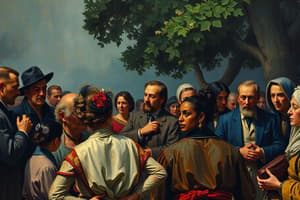Podcast
Questions and Answers
What is the difference between a primary group and a secondary?
What is the difference between a primary group and a secondary?
A primary group
Which of the following is an example of an in-group/out-group dynamic?
Which of the following is an example of an in-group/out-group dynamic?
- Members of a sports team refusing to let outsiders attend their practice
- Members of sorority Delta Delta Delta advising their pledges not to socialize with members of rival sorority Sigma Delta Theta (correct)
- An open community event where everyone is welcome
- Friends gathering for a public demonstration
What is a total institution?
What is a total institution?
An organization in which participants live a controlled lifestyle and in which resocialization occurs.
What characterizes an instrumental leader?
What characterizes an instrumental leader?
Why do people conform to a group according to Solomon Asch?
Why do people conform to a group according to Solomon Asch?
The United States Government is a form of what?
The United States Government is a form of what?
What does the McDonaldization of Society refer to?
What does the McDonaldization of Society refer to?
What is a reference group?
What is a reference group?
What type of organization does a court-ordered member of a rehabilitation center join?
What type of organization does a court-ordered member of a rehabilitation center join?
How is meritocracy defined?
How is meritocracy defined?
Flashcards are hidden until you start studying
Study Notes
Primary vs. Secondary Groups
- A primary group consists of individuals who interact closely and regularly, fostering strong emotional ties and personal connections.
- Secondary groups are larger, more impersonal, and less emotionally involved, primarily formed for specific purposes or tasks.
In-Group/Out-Group Dynamics
- In-group: a group with which a person identifies and feels a sense of belonging.
- Out-group: a group that a person does not identify with and may perceive negatively, such as rival sororities advising against socializing with each other.
Total Institutions
- Total institutions are organizations where individuals are isolated from society and controlled in their daily lives, often undergoing resocialization, such as rehab centers, prisons, or military boot camps.
Instrumental Leadership
- Instrumental leaders focus on achieving specific goals and task completion, prioritizing efficiency and effectiveness over group morale.
Conformity and Group Dynamics
- Solomon Asch found that individuals often conform because they perceive the group as possessing superior knowledge or information, driving a tendency to follow group norms.
Bureaucracy
- The U.S. Government operates as a bureaucracy, characterized by hierarchical structure, clear rules and regulations, and systematic processes.
McDonaldization of Society
- McDonaldization describes the spread of the fast-food business model, characterized by efficiency, calculability, predictability, and control, to various social institutions such as education and healthcare.
Reference Groups
- Reference groups are the groups against which individuals evaluate themselves, influencing their attitudes, behaviors, and sense of identity.
Coercive Organizations
- A coercive organization is one that individuals are compelled to join, often for rehabilitation or correction, exemplified by court-ordered rehabilitation for drug addiction.
Meritocracy
- Meritocracy refers to a system where advancement within a bureaucracy is determined based on documented skills and abilities, rather than personal connections or arbitrary criteria.
Studying That Suits You
Use AI to generate personalized quizzes and flashcards to suit your learning preferences.




